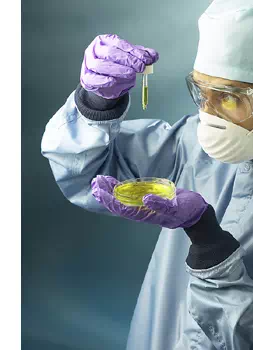|
 Persistent Bioaccumulative Toxics and Related Toxins Persistent Bioaccumulative Toxics and Related Toxins
PBTs
EPA Persistent Bioaccumulative
and Toxic (PBT) Chemical Program
Includes technical information, resource links, and strategies and action plans
for mitigation.
Mercury
Mercury
Information about mercury and how to eliminate mercury use.
Dioxin
Dioxin and Related Compounds
Information from the U.S. Environmental Protection Agency on dioxin, including
a draft dioxin reassessment document. "Skin rashes, liver damage, weight
loss, and a reduction in the effectiveness of the immune system have all
been attributed to human exposure to dioxins," according to the U.S.
EPA. Read the EPA position
statement on dioxin and combustion. (PDF)
Dioxin
Information from Health Care Without Harm on dioxin, "a highly toxic and
persistent family of chemicals that is an unintentional byproduct of medical
waste incineration and PVC plastic production."
Why Health Care is Moving Away From PVC (PDF)
Prevention of Dioxin
Generation from PVC Plastic Use By Health Care Facilities
In a 1996 policy statement, the American Public Health Association urged all
health care facilities to explore ways to reduce or eliminate their use of
PVC plastics, and called upon health care professionals to "encourage
health care institutions with which they are associated to adopt policies that
will lead toward the reduction and elimination of the use of PVC plastic products."
Dioxins and Their
Effects on Human Health
Information about dioxins, their sources, and their effects on human health
from the World Health Organization.
List of Dioxin
and Related Resolutions
Resolutions and shareholder MOUs on dioxin, PVC, DEHP, and medical waste incineration,
compiled by Health Care Without Harm.
U.S. EPA
Inventory of Sources of Dioxin in the United States
Regulations, incinerator closures and better waste management are reducing
dioxin pollution in the U.S., according to the U.S. Environmental Protection
Agency.
FDA dioxin FAQs: http://www.fda.gov/Food/FoodSafety/FoodContaminantsAdulteration/ChemicalContaminants/DioxinsPCBs/ucm077524.htm#top
USDA / FSIS dioxin resources: http://www.fsis.usda.gov/factsheets/Dioxin_Resources/index.asp
Hexachlorobenzene
Hexachlorobenzene
Hexachlorobenzene is a probable human carcinogen; small quantities can be produced
during combustion of municipal waste.
PAHs
Polycyclic Aromatic
Hydrocarbons (PAHs)
PAHs may reasonably be expected to be carcinogens. PAHs can be formed during
the incineration of municipal waste.
|

